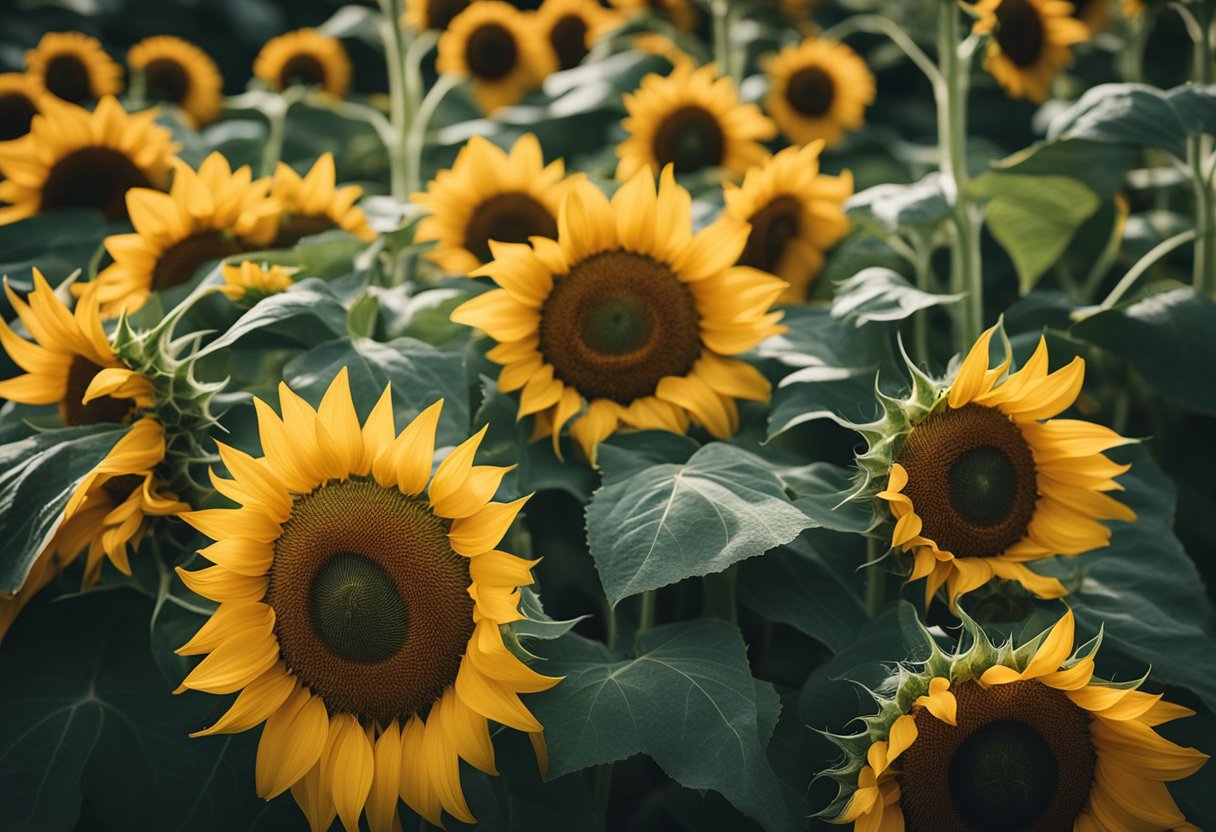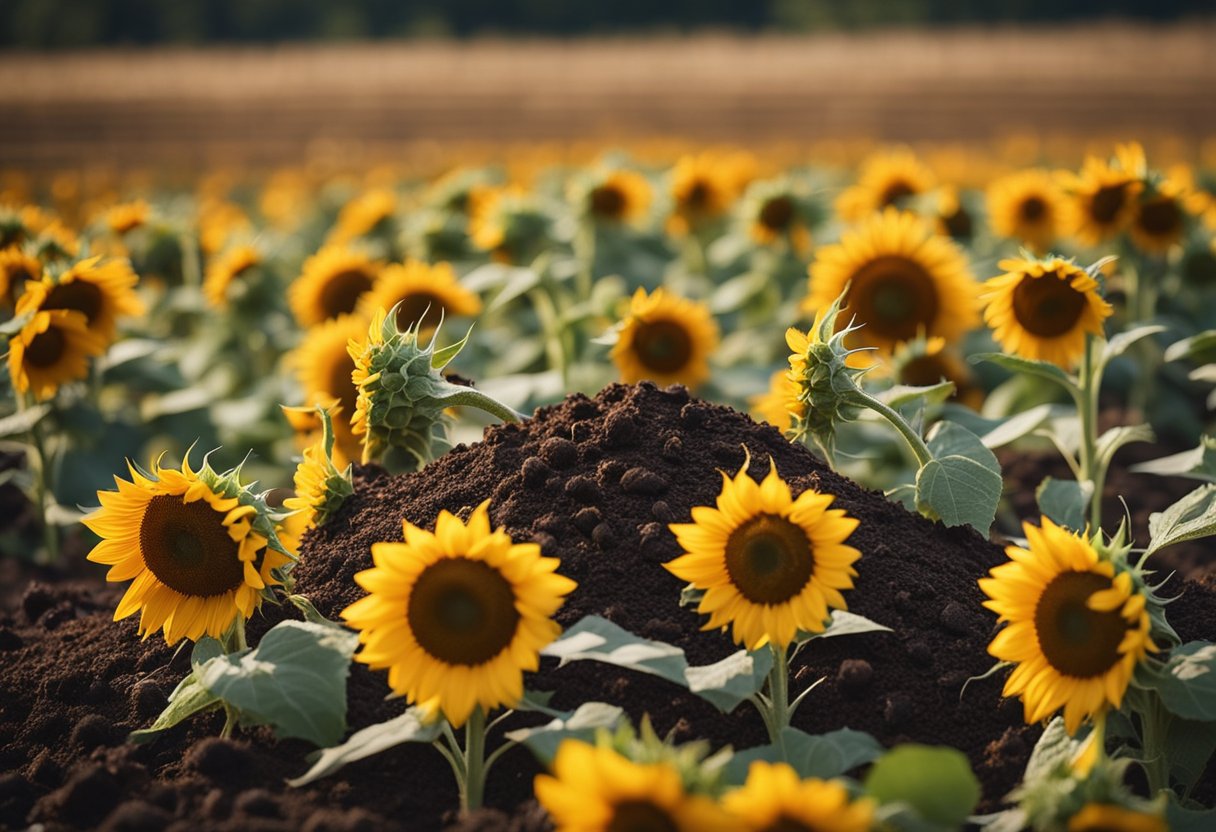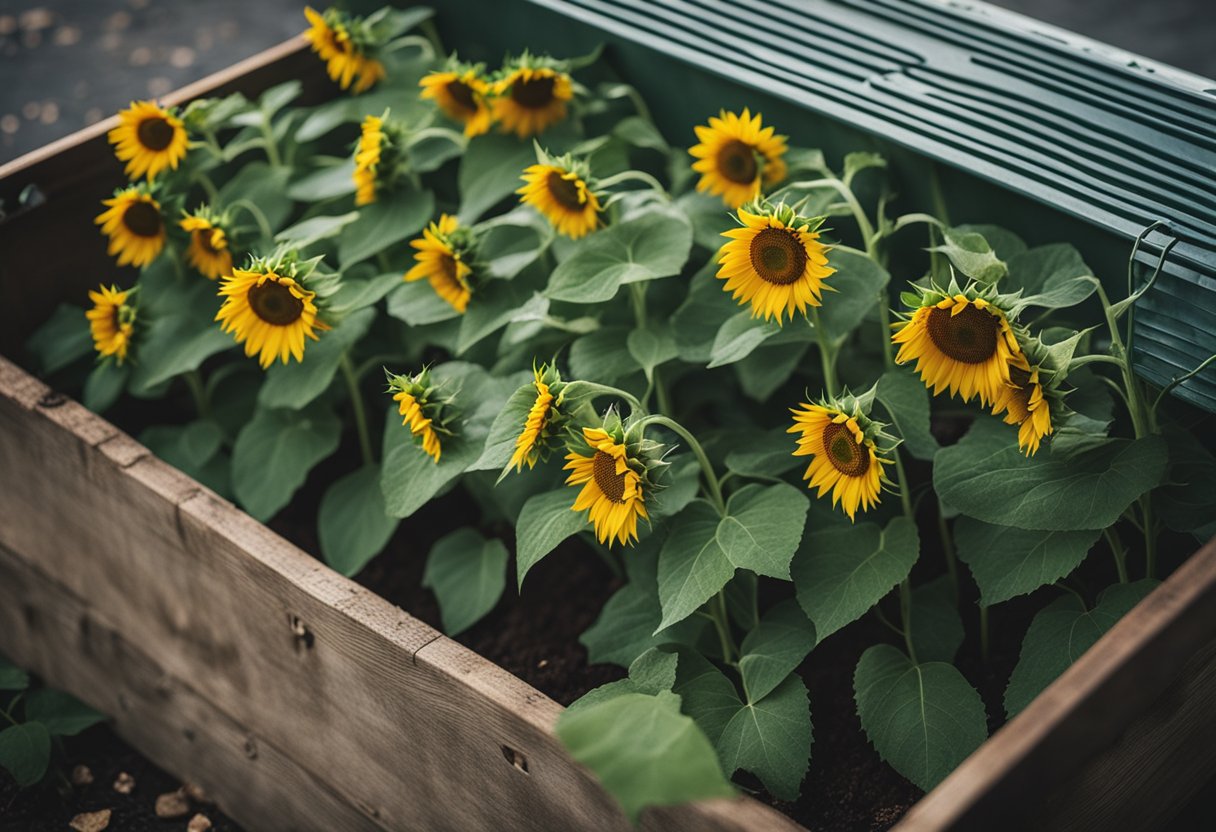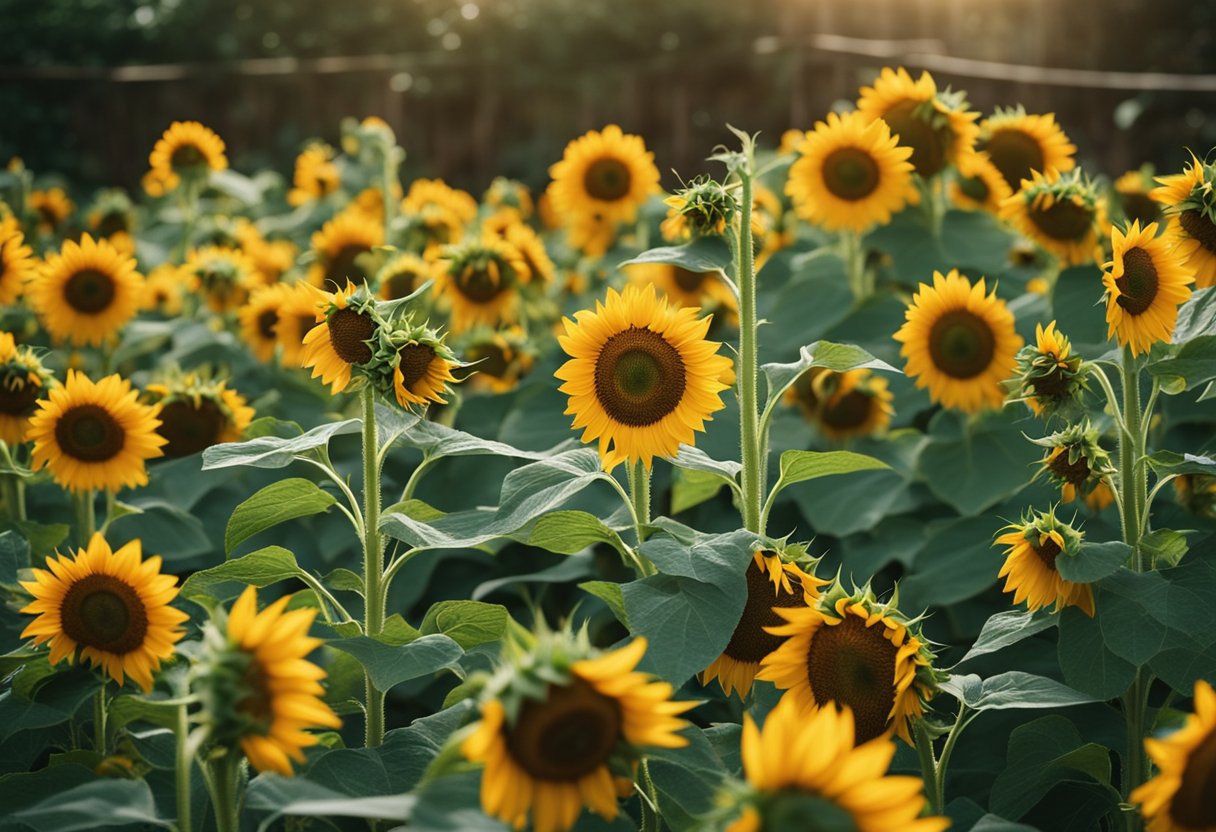As an Amazon Associate I earn from qualifying purchases.
At A Glance
Yes, you can compost sunflowers. Sunflowers are organic material and will decompose in a compost pile over time. It’s advisable to cut or break down the stalks and leaves into smaller pieces to expedite the composting process. However, if the sunflowers have been treated with pesticides or other chemicals, it might be best to avoid composting them, or ensure they are thoroughly cleaned before adding to your compost pile to prevent any potential contamination.
Composting is a natural process that transforms organic materials into nutrient-rich soil amendments. If you’re an avid gardener, you may be wondering if you can compost sunflowers. The good news is that sunflowers are a great addition to any compost pile as they provide essential nutrients and organic matter that enriches the soil.

Sunflowers can be a valuable addition to your compost pile. By breaking down organic materials such as food scraps, grass clippings, and leaves, composting is an excellent way to reduce waste while also improving the quality of your garden soil. However, there are a few things you should keep in mind when composting sunflowers, such as whether you can compost sunflower seeds or sunflower stalks. In this article, we will delve into the world of composting and explore whether sunflowers can be composted, and how to do it properly.
Understanding Composting

Basics of Composting
Composting is the process of breaking down organic waste into nutrient-rich soil. Organic waste includes materials such as fruit peels, vegetable scraps, leaves, and grass clippings. Composting is an eco-friendly way to reduce waste and create a valuable resource for your garden.
The process of composting involves the decomposition of organic matter by microorganisms like bacteria, fungi, and worms. These organisms break down the materials, resulting in a nutrient-rich substance known as compost.
Importance of Composting
Composting is an important part of sustainability and reducing waste. Instead of throwing organic materials into the trash, composting allows us to repurpose those materials and create a valuable resource for our gardens. Composting also reduces the amount of waste that goes into landfills, which can have a negative impact on the environment.
In addition to being eco-friendly, composting also has practical benefits. Compost can improve soil structure, increase water retention, and provide essential nutrients to plants.
Composting Methods
There are many different methods for composting, but the most common methods include compost piles and compost bins. Compost piles are simply piles of organic material that are allowed to decompose over time. Compost bins are containers that are specifically designed for composting and can help control temperature and moisture levels.
To start composting, you will need to gather organic materials and add them to your compost pile or bin. It’s important to have a good mix of green materials (such as fruit and vegetable scraps) and brown materials (such as leaves and twigs) to ensure proper decomposition. You can also add things like coffee grounds, eggshells, and shredded paper to your compost.
It’s important to keep your compost pile or bin moist and well-aerated to ensure proper decomposition. You can turn your compost pile regularly to help speed up the process. Depending on the method you use, compost can take anywhere from a few weeks to several months to fully decompose.
Overall, composting is a simple and effective way to reduce waste and create a valuable resource for your garden. By understanding the basics of composting and choosing the right composting method for your needs, you can create nutrient-rich soil and help protect the environment.
Sunflowers and Their Properties

Overview of Sunflowers
Sunflowers (Helianthus) are a genus of plants that belong to the Asteraceae family. They are known for their tall stems and large, bright yellow flower heads. Sunflowers are annual or perennial plants, and they can grow up to 12 feet tall. They are native to North America and were first cultivated by Native Americans for their seeds and oil.
Sunflower Seeds
Sunflower seeds are a popular snack food and are often used in cooking and baking. They are a good source of protein, fiber, and healthy fats. Sunflower seeds can also be used to make oil, which is used in cooking and as a base for salad dressings.
Sunflower Stalks and Leaves
Sunflower stalks and leaves can be used as a source of organic matter for composting. They are rich in nitrogen and can help to speed up the decomposition process. Sunflower stalks and leaves can also be used as mulch to help retain moisture in the soil and suppress weeds.
In conclusion, sunflowers are a versatile plant that can be used for a variety of purposes. Sunflower seeds are a nutritious food source, while sunflower stalks and leaves can be used for composting and mulching. Whether you are growing tall sunflowers for their impressive flower heads or using the plant for its nutritional and environmental benefits, sunflowers are a great addition to any garden.
Composting Sunflowers

When it comes to composting, sunflowers can be a great addition to your compost pile. They are rich in carbon and provide a valuable source of organic matter. However, there are some important things to keep in mind when composting sunflowers.
Preparation for Composting
Before adding sunflowers to your compost pile, it’s important to prepare them properly. This involves chopping the sunflower stalks into smaller pieces, shredding the leaves, and removing any large seeds or seed hulls. This will help speed up the composting process and prevent the seeds from sprouting in your compost pile.
Composting Process
Once the sunflowers are prepared, they can be added to your compost pile. It’s important to mix them with other green and brown materials to create a balanced compost. This will help ensure that your compost contains the right levels of nitrogen and carbon, which are essential for healthy plant growth.
To speed up the composting process, it’s important to maintain the right level of moisture in your compost pile. Sunflowers contain a lot of moisture, so it’s important to balance this out with dry materials like leaves or straw.
Composting Challenges and Solutions
One challenge when composting sunflowers is their allelopathic properties. This means that they release chemicals that can inhibit the growth of other plants. To prevent this from happening, it’s important to mix sunflowers with other materials in your compost pile.
Another challenge when composting sunflowers is the presence of large seeds or seed hulls. These can take a long time to break down in your compost pile, so it’s important to remove them before adding sunflowers to your compost.
Overall, composting sunflowers can be a great way to add organic matter to your garden soil. By following these tips, you can ensure that your compost pile is healthy and balanced, and that your sunflowers are transformed into nutrient-rich compost that will benefit your plants.
Benefits of Composting Sunflowers
Composting sunflowers is a great way to reduce waste going to landfills and greenhouse gas emissions, while promoting sustainability and improving soil fertility. Sunflowers are a valuable addition to compost piles as they are rich in nitrogen, potassium, and phosphorus. Here are some of the benefits of composting sunflowers:
Soil Improvement
Composting sunflowers can improve soil fertility and structure by adding organic matter and essential nutrients to the soil. Sunflowers are rich in nitrogen, potassium, and phosphorus, which are essential nutrients for plant growth. These nutrients help improve soil health, increase soil water holding capacity, and promote root growth.
Pest Control
Composting sunflowers can also help control pests and insects in your garden. Sunflowers contain a natural compound called allelopathic, which can suppress the growth of weeds and other plants. When sunflowers are composted, this compound is released into the soil, helping to control weed growth and other pests.
Environmental Impact
Composting sunflowers is a sustainable gardening practice that can help reduce waste going to landfills and greenhouse gas emissions. When organic matter is sent to landfills, it decomposes anaerobically, producing methane, a potent greenhouse gas. Composting sunflowers helps to reduce the amount of organic matter sent to landfills, reducing greenhouse gas emissions and promoting sustainability.
In summary, composting sunflowers is a great way to improve soil fertility, control pests and insects, and promote sustainability in your garden. By adding sunflowers to your compost pile, you can create a nutrient-rich soil amendment that will help your plants thrive.
Frequently Asked Questions
As someone who composts regularly, I often get asked if sunflowers can be composted. Below are some frequently asked questions about composting sunflowers.
Can I compost sunflower seeds?
Yes, sunflower seeds can be composted. They make great additions to your compost pile, providing valuable nutrients to your soil. However, if you’re planning on using them for bird feeders, roasting, or baking, be sure to save the shells for composting. You can also use leftover sunflower seed oil and its byproducts in your compost as well.
Can sunflower heads with seeds be composted?
Yes, sunflower heads with seeds can be composted. However, keep in mind that the seeds may sprout if the conditions are right. If you don’t want sunflowers growing in your compost, you can remove the heads and dispose of them separately.
Can sunflower trimmings be composted?
Yes, sunflower trimmings can be composted. When trimming your sunflowers, be sure to chop them up into small pieces to speed up the decomposition process.
Can kitchen scraps be composted with sunflowers?
Yes, kitchen scraps can be composted with sunflowers. However, be sure to balance your greens and browns properly to avoid any unpleasant odors or pest problems.
Can sprouted sunflowers be composted?
Yes, sprouted sunflowers can be composted. Just be sure to chop them up into small pieces to avoid any potential sprouting in your compost.
Can sunflowers be composted in full sun?
Yes, sunflowers can be composted in full sun. However, be sure to keep your compost pile moist by misting it with water regularly.
Should I consult a master gardener before composting sunflowers?
While it’s not necessary to consult a master gardener before composting sunflowers, it’s always a good idea to consult with an expert if you have any questions or concerns about your composting process.
